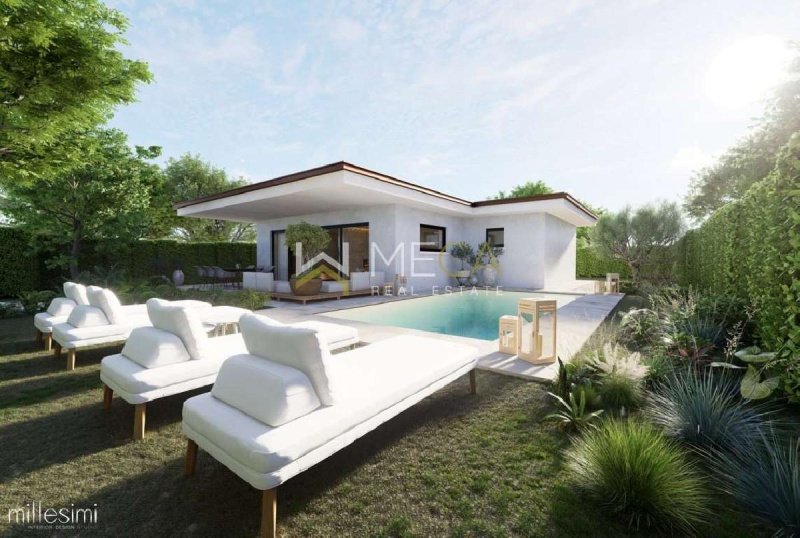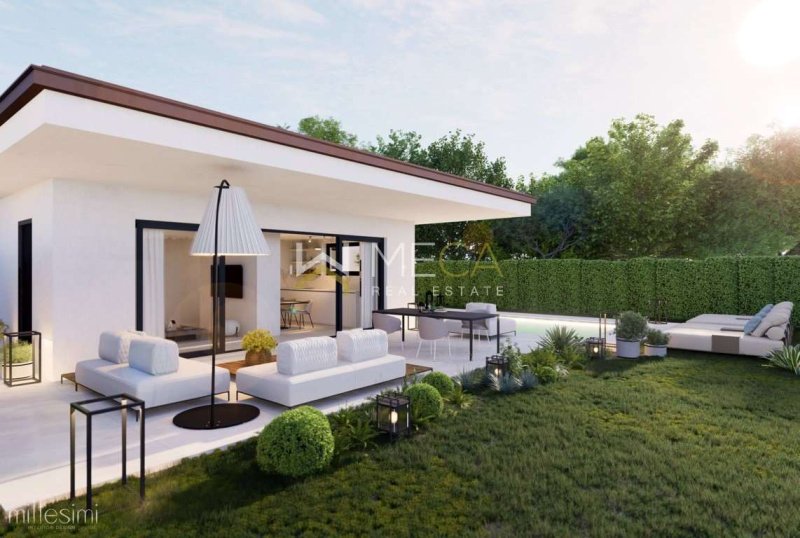1,050,000 €
4间卧室别墅, 160 m² 马内尔巴德尔加尔达, Brescia (省) 加尔达湖
加尔达湖


- 1 / 25
- 2 / 25
- 3 / 25
- 4 / 25
- 5 / 25
- 6 / 25
- 7 / 25
- 8 / 25
- 9 / 25
- 10 / 25
- 11 / 25
- 12 / 25
- 13 / 25
- 14 / 25
- 15 / 25
- 16 / 25
- 17 / 25
- 18 / 25
- 19 / 25
- 20 / 25
- 21 / 25
- 22 / 25
- 23 / 25
- 24 / 25
- 25 / 25
主要特点
- 花园
- 游泳池
- 车库
描述
马内尔巴德尔加尔达,优雅的别墅的新建筑位于约500米的湖和湖畔长廊。
别墅是完全独立的,站在一个完全阳光明媚的地区,建在单层楼和地下室。
别墅周围环绕着宽敞的花园,提供隐私,配有精致的设计元素,并配有最先进的技术系统。
由主楼层组成,起居区超过35平方米,可步行,浴室客厅,两间双人卧室和主浴室;
从主楼层可通往约30平方米步行的门廊,私人花园和32平方米的游泳池加热。
地下室包括另外两间双人卧室、浴室、洗衣房、地下室,可直接通往55平方米步行的三车库。
古迹和景点
圣西维诺-加比亚诺建筑遗址,插入联合国教科文组织世界遗产名录,作为阿尔卑斯山周围历史悠久的古老古迹。 历史传说表明,马内尔巴是建立在对女神米内尔瓦的奉献。 她来到这个山谷,一个重要和迷人的中心瓦尔特内西,在那里她种植了橄榄树(它是保护者),并教授了很多艺术。 在他的荣誉有一个寺庙被巴尔巴里亚人摧毁。" 许多学者认为,马内巴的地名源自"米内尔瓦阿尔克斯"。 另一方面,其他人则提到乌鸦苍蝇这个名字(这个词将来自"mon"的结合,这意味着人的武器,和"erb",一个军事区)。 地名将表示,在这种情况下,"一个加固的地方的首席住宅": 这是有道理的,因为它很容易防御任何攻击。 加尔达湖上的人的存在可以追溯到史前时代,更准确地说,可以追溯到新石化晚期(公元前约4000年)。 : 事实上,在罗卡下发现了梅索利蒂奇村的遗迹。 该地区自巴尔多利诺圣科隆巴诺迪修道院庭院的伦巴德时期和索拉罗的修道院以来,一直依赖圣科隆巴诺迪博比奥(PC)修道院和博比奥大修道院。 僧侣对领土进行了福音传说,赞成扩大商业,农业(特别是藤蔓和橄榄树),渔业系统和文化,引入了重要的创新和开放的贸易道路。 加尔达湖上的人的存在可以追溯到史前时代,更准确地说,可以追溯到新石化晚期(公元前约4000年)。 : 事实上,在罗卡下发现了梅索利蒂奇村的遗迹。 该地区属于巴尔多利诺圣科隆巴诺修道院的庭院和索拉洛的修道院。
能量类:
别墅是完全独立的,站在一个完全阳光明媚的地区,建在单层楼和地下室。
别墅周围环绕着宽敞的花园,提供隐私,配有精致的设计元素,并配有最先进的技术系统。
由主楼层组成,起居区超过35平方米,可步行,浴室客厅,两间双人卧室和主浴室;
从主楼层可通往约30平方米步行的门廊,私人花园和32平方米的游泳池加热。
地下室包括另外两间双人卧室、浴室、洗衣房、地下室,可直接通往55平方米步行的三车库。
古迹和景点
圣西维诺-加比亚诺建筑遗址,插入联合国教科文组织世界遗产名录,作为阿尔卑斯山周围历史悠久的古老古迹。 历史传说表明,马内尔巴是建立在对女神米内尔瓦的奉献。 她来到这个山谷,一个重要和迷人的中心瓦尔特内西,在那里她种植了橄榄树(它是保护者),并教授了很多艺术。 在他的荣誉有一个寺庙被巴尔巴里亚人摧毁。" 许多学者认为,马内巴的地名源自"米内尔瓦阿尔克斯"。 另一方面,其他人则提到乌鸦苍蝇这个名字(这个词将来自"mon"的结合,这意味着人的武器,和"erb",一个军事区)。 地名将表示,在这种情况下,"一个加固的地方的首席住宅": 这是有道理的,因为它很容易防御任何攻击。 加尔达湖上的人的存在可以追溯到史前时代,更准确地说,可以追溯到新石化晚期(公元前约4000年)。 : 事实上,在罗卡下发现了梅索利蒂奇村的遗迹。 该地区自巴尔多利诺圣科隆巴诺迪修道院庭院的伦巴德时期和索拉罗的修道院以来,一直依赖圣科隆巴诺迪博比奥(PC)修道院和博比奥大修道院。 僧侣对领土进行了福音传说,赞成扩大商业,农业(特别是藤蔓和橄榄树),渔业系统和文化,引入了重要的创新和开放的贸易道路。 加尔达湖上的人的存在可以追溯到史前时代,更准确地说,可以追溯到新石化晚期(公元前约4000年)。 : 事实上,在罗卡下发现了梅索利蒂奇村的遗迹。 该地区属于巴尔多利诺圣科隆巴诺修道院的庭院和索拉洛的修道院。
能量类:
此文本已自动翻译。
广告商输入的描述
Manerba del Garda, elegant newly built villa located about 500 meters from the lake and the lakeside promenade.
The villa is completely independent, stands on a completely sunny area and is built on a single floor and a basement.
The villa is surrounded by a spacious garden that gives privacy, finished with refined design elements and equipped with the most technologically advanced systems.
Consisting of a main floor with a living area of over 35 square meters of floor space, bathroom, two double bedrooms and main bathroom;
from the main floor you have access to the portico of approximately 30 sqm, private garden and 32 sqm heated swimming pool.
Basement composed of two further double bedrooms, bathroom, laundry room, tavern and direct access to a triple garage of 55 sqm walkable.
Monuments and places of interest
San Sivino-Gabbiano pile-dwelling site, included in the UNESCO World Heritage List, as part of the transnational serial site Prehistoric pile-dwelling sites around the Alps. History Legend has it that Manerba was built in devotion to the goddess Minerva. She came to hide in this valley, an important and evocative center of Valtenesi, where she planted her olive trees (of which she was the protector) and taught many of her arts. A temple was built in her honor but was destroyed by the Barbarians. ' Many scholars believe that the toponym of Manerba derives from "Minerva arx". Others, however, trace this name back to the Cenoman Gauls (the term derives from the union of "mon", meaning man of arms, and "erb", military area). The toponym would indicate, in this case, "a fortified place of residence of the chief": this is plausible given that from the top of the town's fortress it was easy to defend oneself from any attack. The presence of man on Lake Garda dates back to Prehistory, more precisely to the Late Neolithic (around 4000 BC): under the Rocca, in fact, remains of a Mesolithic village were found. Since the Lombard era, the area was part of the court of the Monastery of San Colombano of the Priory of Bardolino and of the priory of Solarolo, dependent on the Abbey of San Colombano of Bobbio (PC) and of the great monastic fiefdom of Bobbio. The monks evangelized the territory, encouraging the expansion of trade, agriculture (especially vines and olives), the fishing system, and culture, introducing important innovations and opening trade routes. The presence of man on Lake Garda dates back to Prehistory, more precisely to the Late Neolithic (around 4000 BC): under the Rocca, in fact, remains of a Mesolithic village were found. Since the Lombard era, the area had been part of the court of the Monastery of San Colombano of the Priory of Bardolino and of the priory of Solarolo.
The villa is completely independent, stands on a completely sunny area and is built on a single floor and a basement.
The villa is surrounded by a spacious garden that gives privacy, finished with refined design elements and equipped with the most technologically advanced systems.
Consisting of a main floor with a living area of over 35 square meters of floor space, bathroom, two double bedrooms and main bathroom;
from the main floor you have access to the portico of approximately 30 sqm, private garden and 32 sqm heated swimming pool.
Basement composed of two further double bedrooms, bathroom, laundry room, tavern and direct access to a triple garage of 55 sqm walkable.
Monuments and places of interest
San Sivino-Gabbiano pile-dwelling site, included in the UNESCO World Heritage List, as part of the transnational serial site Prehistoric pile-dwelling sites around the Alps. History Legend has it that Manerba was built in devotion to the goddess Minerva. She came to hide in this valley, an important and evocative center of Valtenesi, where she planted her olive trees (of which she was the protector) and taught many of her arts. A temple was built in her honor but was destroyed by the Barbarians. ' Many scholars believe that the toponym of Manerba derives from "Minerva arx". Others, however, trace this name back to the Cenoman Gauls (the term derives from the union of "mon", meaning man of arms, and "erb", military area). The toponym would indicate, in this case, "a fortified place of residence of the chief": this is plausible given that from the top of the town's fortress it was easy to defend oneself from any attack. The presence of man on Lake Garda dates back to Prehistory, more precisely to the Late Neolithic (around 4000 BC): under the Rocca, in fact, remains of a Mesolithic village were found. Since the Lombard era, the area was part of the court of the Monastery of San Colombano of the Priory of Bardolino and of the priory of Solarolo, dependent on the Abbey of San Colombano of Bobbio (PC) and of the great monastic fiefdom of Bobbio. The monks evangelized the territory, encouraging the expansion of trade, agriculture (especially vines and olives), the fishing system, and culture, introducing important innovations and opening trade routes. The presence of man on Lake Garda dates back to Prehistory, more precisely to the Late Neolithic (around 4000 BC): under the Rocca, in fact, remains of a Mesolithic village were found. Since the Lombard era, the area had been part of the court of the Monastery of San Colombano of the Priory of Bardolino and of the priory of Solarolo.
自动翻译所用的语言
Manerba del Garda, elegante villa di nuova realizzazione posizionata a circa 500 metri dal lago e dalla passeggiata lungolago.
La villa è completamente indipendente, sorge su un'area completamente soleggiata ed è realizzata su un piano singolo e un piano interrato.
La villa è circondata da un giardino spazioso che dona privacy, rifinita con elementi di design ricercati e dotata dell'impiantistica tecnologicamente più avanzata.
Composta da piano nobile con zona giorno di oltre 35 mq calpestabili, bagno giorno, due camere matrimoniali e bagno principale;
dal piano nobile si ha accesso al porticato di circa 30 mq calpestabili, giardino privato e piscina di 32 mq riscaldata.
Piano interrato composto da ulteriori due camere matrimoniali, bagno, lavanderia, taverna e accesso diretto a garage triplo di 55 mq calpestabili.
Monumenti e luoghi d'interesse
Sito palafitticolo San Sivino-Gabbiano, inserito nella lista del Patrimonio dell'Umanità dell'UNESCO, nell'ambito del sito seriale transnazionale Siti palafitticoli preistorici attorno alle Alpi. Storia La leggenda narra che Manerba fu eretta in devozione alla dea Minerva. Ella venne a nascondersi in questa valle, importante e suggestivo centro della Valtenesi, dove piantó i suoi ulivi (dei quali era la protettrice) e insegnó molte delle sue arti. In suo onore fu costituito un tempio che peró venne distrutto dai Barbari.' Molti studiosi credono che il toponimo di Manerba derivi da "Minerva arx". Altri invece fanno risalire tale nome ai galli cenomani (il termine deriverebbe dall'unione di "mon", che significa uomo d'armi, ed "erb", zona militare). Il toponimo indicherebbe, in questo caso, "un luogo fortificato residenza del capo": ció è plausibile dato che dall'alto della Rocca del paese risultava agevole difendersi da qualunque attacco. La presenza dell'uomo sul Lago di Garda risale alla Preistoria, più precisamente al Tardo Neolitico (circa 4000 a.C.): sotto la Rocca, infatti, sono stati ritrovati resti di un villaggio del Mesolitico. La zona faceva parte fin dall'epoca longobarda della corte del Monastero di San Colombano del Priorato di Bardolino e della prioria di Solarolo, dipendente dall'Abbazia di San Colombano di Bobbio (PC) e del grande feudo monastico di Bobbio. I monaci evangelizzarono il territorio favorendo l'espansione dei commerci, dell'agricoltura (specie la vite e l'olivo), del sistema di pesca, e della cultura, introducendo importanti innovazioni ed aprendo vie commerciali. La presenza dell'uomo sul Lago di Garda risale alla Preistoria, più precisamente al Tardo Neolitico (circa 4000 a.C.): sotto la Rocca, infatti, sono stati ritrovati resti di un villaggio del Mesolitico. La zona faceva parte fin dall'epoca longobarda della corte del Monastero di San Colombano del Priorato di Bardolino e della prioria di Solarolo.
CLASSE ENERGETICA:
La villa è completamente indipendente, sorge su un'area completamente soleggiata ed è realizzata su un piano singolo e un piano interrato.
La villa è circondata da un giardino spazioso che dona privacy, rifinita con elementi di design ricercati e dotata dell'impiantistica tecnologicamente più avanzata.
Composta da piano nobile con zona giorno di oltre 35 mq calpestabili, bagno giorno, due camere matrimoniali e bagno principale;
dal piano nobile si ha accesso al porticato di circa 30 mq calpestabili, giardino privato e piscina di 32 mq riscaldata.
Piano interrato composto da ulteriori due camere matrimoniali, bagno, lavanderia, taverna e accesso diretto a garage triplo di 55 mq calpestabili.
Monumenti e luoghi d'interesse
Sito palafitticolo San Sivino-Gabbiano, inserito nella lista del Patrimonio dell'Umanità dell'UNESCO, nell'ambito del sito seriale transnazionale Siti palafitticoli preistorici attorno alle Alpi. Storia La leggenda narra che Manerba fu eretta in devozione alla dea Minerva. Ella venne a nascondersi in questa valle, importante e suggestivo centro della Valtenesi, dove piantó i suoi ulivi (dei quali era la protettrice) e insegnó molte delle sue arti. In suo onore fu costituito un tempio che peró venne distrutto dai Barbari.' Molti studiosi credono che il toponimo di Manerba derivi da "Minerva arx". Altri invece fanno risalire tale nome ai galli cenomani (il termine deriverebbe dall'unione di "mon", che significa uomo d'armi, ed "erb", zona militare). Il toponimo indicherebbe, in questo caso, "un luogo fortificato residenza del capo": ció è plausibile dato che dall'alto della Rocca del paese risultava agevole difendersi da qualunque attacco. La presenza dell'uomo sul Lago di Garda risale alla Preistoria, più precisamente al Tardo Neolitico (circa 4000 a.C.): sotto la Rocca, infatti, sono stati ritrovati resti di un villaggio del Mesolitico. La zona faceva parte fin dall'epoca longobarda della corte del Monastero di San Colombano del Priorato di Bardolino e della prioria di Solarolo, dipendente dall'Abbazia di San Colombano di Bobbio (PC) e del grande feudo monastico di Bobbio. I monaci evangelizzarono il territorio favorendo l'espansione dei commerci, dell'agricoltura (specie la vite e l'olivo), del sistema di pesca, e della cultura, introducendo importanti innovazioni ed aprendo vie commerciali. La presenza dell'uomo sul Lago di Garda risale alla Preistoria, più precisamente al Tardo Neolitico (circa 4000 a.C.): sotto la Rocca, infatti, sono stati ritrovati resti di un villaggio del Mesolitico. La zona faceva parte fin dall'epoca longobarda della corte del Monastero di San Colombano del Priorato di Bardolino e della prioria di Solarolo.
CLASSE ENERGETICA:
Manerba del Garda, elegante Neubauvilla, etwa 500 Meter vom See und der Seepromenade entfernt.
Die Villa ist völlig unabhängig, steht auf einem völlig sonnigen Grundstück und ist auf einer Etage und einem Keller gebaut.
Die Villa ist von einem weitläufigen Garten umgeben, der Privatsphäre bietet, mit raffinierten Designelementen versehen und mit den technologisch fortschrittlichsten Systemen ausgestattet ist.
Bestehend aus einer Hauptetage mit einer Wohnfläche von über 35 Quadratmetern Wohnfläche, Badezimmer, zwei Doppelschlafzimmern und Hauptbadezimmer;
Von der Hauptetage aus haben Sie Zugang zum Portikus von ca. 30 qm, zum privaten Garten und zum beheizten Pool von 32 qm.
Keller bestehend aus zwei weiteren Doppelzimmern, Badezimmer, Waschküche, Taverne und direktem Zugang zu einer begehbaren Dreifachgarage von 55 m².
Denkmäler und Sehenswürdigkeiten
Die Pfahlbaustätte San Sivino-Gabbiano wurde in die Liste des UNESCO-Weltkulturerbes aufgenommen und ist Teil der länderübergreifenden Serie Prähistorische Pfahlbaustätten rund um die Alpen. Der Legende nach wurde Manerba zu Ehren der Göttin Minerva erbaut. Sie versteckte sich in diesem Tal, einem wichtigen und eindrucksvollen Zentrum von Valtenesi, wo sie ihre Olivenbäume pflanzte (deren Beschützerin sie war) und viele ihrer Künste lehrte. Zu ihren Ehren wurde ein Tempel errichtet, der jedoch von den Barbaren zerstört wurde. Viele Gelehrte glauben, dass der Ortsname Manerba von Minerva arx abgeleitet ist. Andere führen diesen Namen jedoch auf die Cenoman-Gallier zurück (der Begriff leitet sich von der Vereinigung von mon, was Waffenmann bedeutet, und erb, militärisches Gebiet, ab). Der Ortsname würde in diesem Fall auf einen befestigten Wohnsitz des Häuptlings hinweisen: Dies ist plausibel, da man sich von der Spitze der Stadtfestung aus leicht gegen jeden Angriff verteidigen konnte.
Die Anwesenheit des Menschen am Gardasee geht auf die Vorgeschichte zurück, genauer gesagt auf das Spätneolithikum (um 4000 v. Chr.): Unter der Rocca wurden tatsächlich Überreste eines mesolithischen Dorfes gefunden. Seit der Langobardenzeit war das Gebiet Teil des Hofes des Klosters San Colombano des Priorats Bardolino und des Priorats Solarolo, abhängig von der Abtei San Colombano di Bobbio (PC) und dem großen Klosterlehen von Bobbio . Die Mönche evangelisierten das Gebiet, förderten die Ausweitung des Handels, der Landwirtschaft (insbesondere Weinbau und Olivenanbau), des Fischereisystems und der Kultur, führten wichtige Innovationen ein und eröffneten Handelswege. Die Anwesenheit des Menschen am Gardasee geht auf die Vorgeschichte zurück, genauer gesagt auf das Spätneolithikum (um 4000 v. Chr.)Unter der Rocca wurden tatsächlich Überreste eines mesolithischen Dorfes gefunden. Seit der Langobardenzeit war das Gebiet Teil des Hofes des Klosters San Colombano des Priorats Bardolino und des Priorats Solarolo.
Die Villa ist völlig unabhängig, steht auf einem völlig sonnigen Grundstück und ist auf einer Etage und einem Keller gebaut.
Die Villa ist von einem weitläufigen Garten umgeben, der Privatsphäre bietet, mit raffinierten Designelementen versehen und mit den technologisch fortschrittlichsten Systemen ausgestattet ist.
Bestehend aus einer Hauptetage mit einer Wohnfläche von über 35 Quadratmetern Wohnfläche, Badezimmer, zwei Doppelschlafzimmern und Hauptbadezimmer;
Von der Hauptetage aus haben Sie Zugang zum Portikus von ca. 30 qm, zum privaten Garten und zum beheizten Pool von 32 qm.
Keller bestehend aus zwei weiteren Doppelzimmern, Badezimmer, Waschküche, Taverne und direktem Zugang zu einer begehbaren Dreifachgarage von 55 m².
Denkmäler und Sehenswürdigkeiten
Die Pfahlbaustätte San Sivino-Gabbiano wurde in die Liste des UNESCO-Weltkulturerbes aufgenommen und ist Teil der länderübergreifenden Serie Prähistorische Pfahlbaustätten rund um die Alpen. Der Legende nach wurde Manerba zu Ehren der Göttin Minerva erbaut. Sie versteckte sich in diesem Tal, einem wichtigen und eindrucksvollen Zentrum von Valtenesi, wo sie ihre Olivenbäume pflanzte (deren Beschützerin sie war) und viele ihrer Künste lehrte. Zu ihren Ehren wurde ein Tempel errichtet, der jedoch von den Barbaren zerstört wurde. Viele Gelehrte glauben, dass der Ortsname Manerba von Minerva arx abgeleitet ist. Andere führen diesen Namen jedoch auf die Cenoman-Gallier zurück (der Begriff leitet sich von der Vereinigung von mon, was Waffenmann bedeutet, und erb, militärisches Gebiet, ab). Der Ortsname würde in diesem Fall auf einen befestigten Wohnsitz des Häuptlings hinweisen: Dies ist plausibel, da man sich von der Spitze der Stadtfestung aus leicht gegen jeden Angriff verteidigen konnte.
Die Anwesenheit des Menschen am Gardasee geht auf die Vorgeschichte zurück, genauer gesagt auf das Spätneolithikum (um 4000 v. Chr.): Unter der Rocca wurden tatsächlich Überreste eines mesolithischen Dorfes gefunden. Seit der Langobardenzeit war das Gebiet Teil des Hofes des Klosters San Colombano des Priorats Bardolino und des Priorats Solarolo, abhängig von der Abtei San Colombano di Bobbio (PC) und dem großen Klosterlehen von Bobbio . Die Mönche evangelisierten das Gebiet, förderten die Ausweitung des Handels, der Landwirtschaft (insbesondere Weinbau und Olivenanbau), des Fischereisystems und der Kultur, führten wichtige Innovationen ein und eröffneten Handelswege. Die Anwesenheit des Menschen am Gardasee geht auf die Vorgeschichte zurück, genauer gesagt auf das Spätneolithikum (um 4000 v. Chr.)Unter der Rocca wurden tatsächlich Überreste eines mesolithischen Dorfes gefunden. Seit der Langobardenzeit war das Gebiet Teil des Hofes des Klosters San Colombano des Priorats Bardolino und des Priorats Solarolo.
细节
- 物业类型
- 别墅
- 状况
- 全新
- 房屋面积
- 160 m²
- 卧室
- 4
- 浴室
- 3
- 花园
- 500 m²
- 能效评级
- A4
- 参考代码
- MECA0597
能效评级 (第90/2013号法律)
更节能
- A4
- A3
- A2
- A1
- B
- C
- D
- E
- F
- G
不节能
什么是能效评级?
能源效率评级是由字母A4到G所表示的值,该值表示基于建筑物外形和气候区等参数的建筑物的能源质量和消耗量。 能效评级越高,建筑物的空调能耗和成本就越低。 请注意:如果建筑物的外形和气候区域不同,则属于同一类别的建筑物的年能耗也可能大不相同。
什么是EPgl(全球能源绩效指数)
EPgl表示建筑或建筑单元达到舒适条件所消耗的能量,并基于现有的能源服务和标准使用下的物业类型。计量单位为kWh/m2/年。
我们建议您与广告商确认物业的能效等评级否已更新为第90/2013号法律。
距兴趣点的距离:
距离以直线计算
- 公共交通
> 20 km - 公交车站
- 海岸
- 139.8 km
- 滑雪胜地
- 9.7 km
马内尔巴德尔加尔达:关于城市的信息
- 海拔
- 高出海平面130m
- 面积
- 36.63 km²
- 地理区域
- 内陆丘陵
- 人口
- 5412
您如何看待该广告的质量?
提供有关此广告的反馈,帮助我们改善您的Gate-away体验。
请不要评估物业本身,而只是评估其展示的质量。
